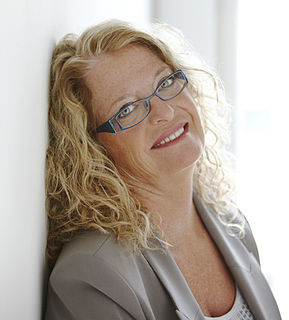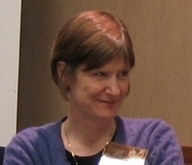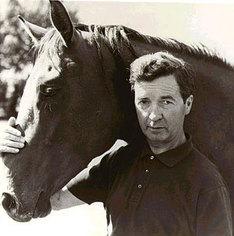A Quote by Frank B. Gilbreth Jr.
Dad himself used to tell a story about one time when Mother went off to fill a lecture engagement and left him in charge at home. When Mother returned, she asked him if everything had run smoothly. Didn't have any trouble except with that one over there,' he replied. 'But a spanking brought him into line.' Mother could handle any crisis without losing her composure. That's not one of ours, dear,' she said. 'He belongs next door.
Quote Topics
Related Quotes
Once," Balinda begins softly, "when I was in the emergency room with my mother they brought in a murderer who had been shot and was dying, right there in front of us. I watched as the nurse touched his face and reassured him and I could not believe they were being so nice to him.""What happened?" Jill asked."My mother rose up, took my arm, gripped it as if she was a weight lifter and said, 'he was a beautiful baby once and his mother loved him'.
Sometimes we adopt certain beliefs when we're children and use them automatically when we become adults, without ever checking them out against reality. This brings to mind the story of the woman who always cut off the end of the turkey when she put it in the oven. Her daughter asked her why, and her mother responded, "I don't know. My mother always did it." Then she went and asked her mother, who said, "I don't know. My mother always did it." The she went and asked her grandmother, who said, "The oven wasn't big enough."
And he absolutely had to find her at once to tell her that he adored her, but the large audience before him separated him from the door, and the notes reaching him through a succession of hands said that she was not available; that she was inaugurating a fire; that she had married an american businessman; that she had become a character in a novel; that she was dead.
Elizabeth’s hands flew to her mouth; tears filled her eyes with happiness as she realized he was fulfilling yet another of her and her mother’s intended activities. “Why are you fulfilling all of my mother’s dreams?” she asked, studying his face and searching for answers. “So you don’t run away like she did in search of them,” he replied, taking her hand. “Come on, join in!” he said, leaping around.
Even his highly emotional Italian mother didn't believe that true love could blossom overnight. Like his brothers and sisters-in-law, she wanted nothing more for him than to marry and start a family, but if he showed up at her doorstep and said that he'd met someone two days ago and knew she was the one for him, his mother would smack him with a broom, curse in Italian, and drag him to church, sure that he had some serious sins that needed confessing.
My mother had a life-altering stroke when I was nineteen and she died when I was twenty-three. I'm now older than my mother when she died and my relationship with her has really changed over these many years. I continue to stay interested in her and I know her differently now. Losing my mother, losing dear friends, is now part of the fabric of my being alive. And the fabric keeps changing, which is interesting.
And she loved a man who was made out of nothing. A few hours without him and right away she’d be missing him with her whole body, sitting in her office surrounded by polyethylene and concrete and thinking of him. And every time she’d boil water for coffee in her ground-floor office, she’d let the steam cover her face, imagining it was him stroking her cheeks, her eyelids and she’d wait for the day to be over, so she could go to her apartment building, climb the flight of stairs, turn the key in the door, and find him waiting for her, naked and still between the sheets of her empty bed.
As Anna Freud remarked, the toddler who wanders off into some other aisle, feels lost, and screams anxiously for his mother neversays "I got lost," but accusingly says "You lost me!" It is a rare mother who agrees that she lost him! she expects her child to stay with her; in her experience it is the child who has lost track of the mother, while in the child's experience it is the mother who has lost track of him. Each view is entirely correct from the perspective of the individual who holds it .
Or perhaps a widow found him and took him in: brought him an easy chair, changed his sweater every morning, shaved his face until the hair stopped growing, took him faithfully to bed with her every night, whispered sweet nothings into what was left of his ear, laughed with him over black coffee, cried with him over yellowing pictures, talked greenly about having kids of her own, began to miss him before she became sick, left him everything in her will, thought of only him as she died, always knew he was fiction but believed in him anyway.
And you're not leaving," she said. "Promise me." It was as if she had asked him to promise to keep breathing, to notice sunshine, to permit the spinning of the earth. What choice did he have? Even if he left her, she would be camped in his heart, an insistent and willful presence. She would match her strides to his on any journey he ever took; she would lie beside him on any bed. Amalie, he said, "that's the easiest promise I've ever had to make.
A lot of people say that Eleanor Roosevelt wasn't a good mother. And there are two pieces to that story. One is, when they were very young, she was not a good mother. She was an unhappy mother. She was an unhappy wife. She had never known what it was to be a good mother. She didn't have a good mother of her own. And so there's a kind of parenting that doesn't happen.
So this is the young man who has intentions toward my little girl." Bobby shifted in his seat and crossed his legs. "It is not fun on this side of the table, is it, Robert?" Uncle Eddie huffed, and Kat had to remember that once upon a time her mother had been a dark-haired girl in that kitchen, and her dad had been the stray she'd brought home. She watched the two men looking at Hale as if they'd never before laid eyes on him. "He's better-looking than the last vagabond I had to take in," Eddie said, standing and carrying empty bowls to the sink. "I'll give him that.
The idea of the book ["The Japanese Lover"] came in a conversation that I had with a friend walking in the streets of New York. We were talking about our mothers, and I was telling her how old my mother was, and she was telling me about her mother. Her mother was Jewish, and she said that she was in a retirement home and that she had had a friend for 40 years that was a Japanese gardener. This person had been very important in my friend's upbringing.
I found out when I was 18 that Dad had left my mother and the family before he realised he was ill and then died. When I asked Mum about it, she just sort of shrugged it off and said she'd thought I knew about it all along. Of course I hadn't, though I'm sure she must have been desperately unhappy at the time.



































